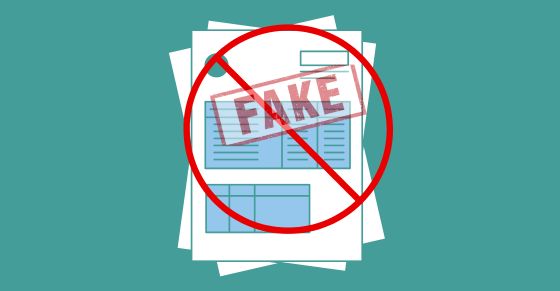What is a fake invoice or record according to regulations in Vietnam?
What is a fake invoice or record according to regulations in Vietnam? What are prohibited acts related to invoices and records in Vietnam?

What is a fake invoice or record according to regulations in Vietnam? (Image from the internet)
What is a fake invoice or record according to regulations in Vietnam?
According to Clause 8, Article 3 of Decree 123/2020/ND-CP, a fake invoice or record is explained as follows:
Fake invoice or record is an invoice or record that is printed or created following the template of invoices and vouchers that have been issued by other organizations or individuals, or printed or created with the same numbering of the same invoice or record symbol, or making fake electronic invoices or electronic vouchers.
What are prohibited acts related to invoices and records in Vietnam?
According to Article 5 of Decree 123/2020/ND-CP, the prohibited acts related to invoices and records in Vietnam are:
- For tax officials
+ Causing inconvenience or difficulties for organizations or individuals coming to purchase invoices, vouchers;
+ Engaging in acts of covering up or colluding with organizations or individuals to use illegal invoices, vouchers;
+ Accepting bribes when inspecting, checking invoices.
- For organizations, individuals selling, providing goods, services, organizations, individuals with rights and obligations related
- Engaging in fraudulent activities such as using illegal invoices, unlawfully using invoices;
- Obstructing tax officials from performing their duties, specifically acts that harm the health or dignity of tax officials when inspecting, checking invoices and vouchers;
- Unauthorized access, alteration, or destruction of information systems regarding invoices and vouchers;
- Bribery or other actions related to invoices, vouchers for illicit gain.
What are rules for issuance, management and use of invoices and records in Vietnam?
According to Article 4 of Decree 123/2020/ND-CP:
(1) When selling goods, providing services, the seller must issue an invoice to the buyer (including instances where goods, services are used for promotions, advertisements, samples; goods, services are given, presented, gifted, exchanged, returned in place of employee wages and internal consumption (except for internal circulation goods for continuous production process); dispatching goods in forms of lending, borrowing or returning goods) and must fill in all contents as stipulated in Article 10 of Decree 123/2020/ND-CP. For electronic invoices, they must comply with the standard data format prescribed by the tax authority as stipulated in Article 12 of Decree 123/2020/ND-CP.
(2) When withholding personal income tax, collecting taxes, fees, charges, the tax withholding organizations, fee, charge collecting organizations, tax collecting organizations must issue withholding vouchers, tax receipts, fee receipts to individuals with withheld income, taxpayers, fee and charge payers and must fill in all contents as stipulated in Article 32 of Decree 123/2020/ND-CP. For electronic receipts, they must comply with the standard data format prescribed by the tax authority. In case of authorizing tax finalization, no personal income tax withholding voucher is issued.
For individuals without a labor contract or with a labor contract under 03 months, the income-paying organizations, individuals can choose to issue tax withholding vouchers for each tax deduction or issue one tax withholding voucher for multiple tax deductions within a tax period. For individuals with labor contracts of 03 months or more, the income-paying organizations, individuals only issue one tax withholding voucher per tax period.
(3) Before using invoices, receipts, businesses, economic organizations, other organizations, households, individuals must register or notify the tax authority according to regulations in Article 15, Article 34, and Clause 1, Article 36 of Decree 123/2020/ND-CP. For invoices, receipts printed by the tax authority, the tax authority notifies the issuance as per Clause 3, Article 24, and Clause 2, Article 36 of Decree 123/2020/ND-CP.
(4) Businesses and economic organizations, households and individuals during use must report the situation of used invoices purchased from the tax authority, used receipts printed, self-printed or purchased from the tax authority as per regulations in Article 29, Article 38 of Decree 123/2020/ND-CP.
(5) Registration, management, and use of electronic invoices and vouchers must comply with laws on electronic transactions, accounting, tax, tax management and regulations in Decree 123/2020/ND-CP.
(6) Invoice and voucher data when selling goods, providing services, voucher data when conducting tax payment transactions, tax deductions, and payment of taxes, fees, and charges is the data basis for tax management and providing invoice, voucher information to relevant organizations and individuals.
(7) Sellers of goods, providers of services who are businesses, economic organizations, and other organizations can delegate third parties to issue electronic invoices for their sales activities. Delegated invoices must still show the seller's name as the delegator. Delegation must be documented between the delegator and the delegatee detailing the delegated invoice information (purpose of delegation, delegation period, delegation invoice payment method) and notify the tax authority when registering for electronic invoice usage. For delegated electronic invoices without the tax authority’s code, the delegator must transfer electronic invoice data to the tax authority through a service provider. The Ministry of Finance provides specific guidance on this matter.
(8) Fee and charge collecting organizations can delegate third parties to issue fee and charge receipts. Delegated receipts must still show the name of the fee and charge collecting organization as the delegator. Delegation must be documented between the delegator and the delegatee detailing the delegated receipt information (purpose of delegation, delegation period, delegation receipt payment method) and notify the tax authority when announcing the issuance of receipts.
- Key word:
- invoice or record
- Vietnam
- Cases of land rent exemption and reduction under the latest regulations in Vietnam
- Economic infrastructure and social infrastructure system in Thu Duc City, Ho Chi Minh City
- Regulations on ordination with foreign elements in religious organizations in Vietnam
- Increase land compensation prices in Vietnam from January 1, 2026
- Determination of land compensation levels for damage during land requisition process in Vietnam
- Who is permitted to purchase social housing according to latest regulations in Vietnam?
-

- Number of deputy directors of departments in Vietnam ...
- 15:04, 05/03/2025
-

- Cases ineligible for pardon in Vietnam in 2025
- 14:43, 05/03/2025
-

- Decree 50/2025 amending Decree 151/2017 on the ...
- 12:00, 05/03/2025
-

- Circular 07/2025 amending Circular 02/2022 on ...
- 11:30, 05/03/2025
-

- Adjustment to the organizational structure of ...
- 10:34, 05/03/2025
-

- Notable new policies of Vietnam effective as of ...
- 16:26, 11/04/2025
-
.Medium.png)
- Notable documents of Vietnam in the previous week ...
- 16:21, 11/04/2025
-
.Medium.png)
- Notable documents of Vietnam in the previous week ...
- 16:11, 02/04/2025
-
.Medium.png)
- Notable new policies of Vietnam to be effective ...
- 16:04, 02/04/2025
-
.Medium.png)
- Notable new policies of Vietnam effective from ...
- 14:51, 21/03/2025

 Article table of contents
Article table of contents
